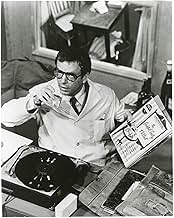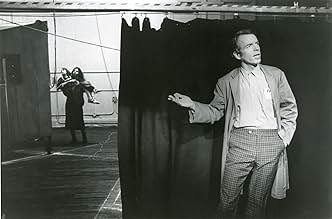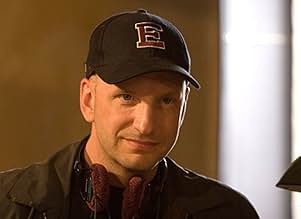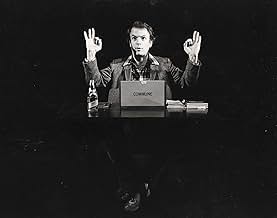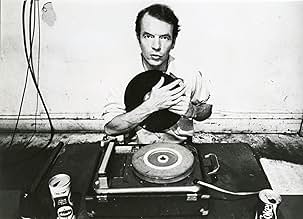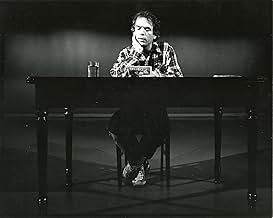ÉVALUATION IMDb
7,1/10
1,4 k
MA NOTE
Ajouter une intrigue dans votre langueA look at the art of Spalding Gray who drew from real life experience to create a compelling and deeply personal series of monologues.A look at the art of Spalding Gray who drew from real life experience to create a compelling and deeply personal series of monologues.A look at the art of Spalding Gray who drew from real life experience to create a compelling and deeply personal series of monologues.
- Prix
- 1 nomination au total
Forrest Gray
- Self
- (archive footage)
- (uncredited)
Kathie Russo
- Self
- (archive footage)
- (uncredited)
Avis en vedette
A look at the art of Spalding Gray who drew from real life experience to create a compelling and deeply personal series of monologues.
I freely admit I did not know Spalding Gray going in to this. I may have seen him in one or two things (such as "The Killing Fields"), but really had no idea who he was or why he was important (if, indeed, he was).
This was excellent, a documentary that works for fans and novices alike. From humorous anecdotes of his childhood to a tale of a homosexual encounter in Greece, we get to know Gray and all his foibles -- no apologies are offered and no sympathy is sought. Love him or hate him, this is the man in his whole.
I freely admit I did not know Spalding Gray going in to this. I may have seen him in one or two things (such as "The Killing Fields"), but really had no idea who he was or why he was important (if, indeed, he was).
This was excellent, a documentary that works for fans and novices alike. From humorous anecdotes of his childhood to a tale of a homosexual encounter in Greece, we get to know Gray and all his foibles -- no apologies are offered and no sympathy is sought. Love him or hate him, this is the man in his whole.
Actor Spalding Gray tells stories through a series of monologue. Director Steven Soderbergh splices together the various segments to create a vision of a man's life through his own words. Spalding is most famous as an actor whose biggest movie is probably 'The Killing Fields'. This is a fascinating experience like sitting in front of the man listening intently at the story teller. It's confessional. It's personal. It's sometimes funny, some shocking, and just a lot of little personal recollections. There is a lot of footage from his one person play. The disembodied laughter is a little bit strange since it depends on which footage is being used. Some footage is just an interview. I have a feeling that the play is a lot more mesmerizing. The movie runs on and on switching from one performance to another to an interview. It feels like a run-on sentence. There are some undeniable laughs. Sometimes I miss some of the laughs from the audiences. It's like I'm missing a comedic beat or some obscure reference.
I wonder if it would be better to have a straight uncut film of the plays. A film that takes in Spalding's pace could allow the stories to hit better. Let's pause for effect. Let's have a break for the audience. The monotone pacing tested my patience after 30 minutes. Of course, a theater performance transferred directly to film almost never works except for comedy specials. This is sorta like that. Then again it isn't. The pacing could be too slow for movie audiences. This is an interesting attempt, but it didn't all work for me.
I wonder if it would be better to have a straight uncut film of the plays. A film that takes in Spalding's pace could allow the stories to hit better. Let's pause for effect. Let's have a break for the audience. The monotone pacing tested my patience after 30 minutes. Of course, a theater performance transferred directly to film almost never works except for comedy specials. This is sorta like that. Then again it isn't. The pacing could be too slow for movie audiences. This is an interesting attempt, but it didn't all work for me.
Just watched this and must say it is totally brilliant.
Soderbergh has brought us SPALDING GRAY'S FINAL MONOLOGUE with the film, "And Everything Is Going Fine".
He compiles what is essentially a final autobiographical testament of Gray's life using rare footage of his TV interviews, recordings of his theatrical monologues, and even some footage taken personally by Gray with his family members.
A simple mash-up of such footage gives Gray the oppourtunity to bring us one final monologue- from the grave- speaking about himself, just as he loved to do...for our pleasure, and his sanity!!! He truly was the best monologist, one-man-show and storyteller to ever grace the stage.
And Soderbergh- whom directed Gray's Anatomy (Gray's 1996 monologue,which is beautifully shot) and King of the Hill (in which Gray played the role of Mr. Mungo)- must get props for not succumbing to the urge of telling Gray's story, but instead appropriately allowing Gray to tell it himself. Collaborating through selectivity and editing, Soderbergh plays a role much like the one he did when filming his earlier monologue.
Gray begins this story by discussing the overwhelming influence his mother had on him...an influence that would consume and eventually take his life. He continues by talking about his journey to Hollywood, becoming an actor, his various escapades, his travels to India, the art of writing and performing monologues, the art of acting, the value of conversing with the audience and people off the street, his marriage, keeping secrets, and ending with a recollection of his experience of being in a major accident, one he would never fully recover from.
Throughout this monologue he reflects upon life, living, death, growing up, sex, love, relationships, experience, creative narcissism, psychology and the limitations of being human, hardship, depression, and, most importantly, introspection.
On January 10, 2004, after watching the film "Big Fish" Spalding Gray got on the Staten Island Ferry from which he would jump, committing suicide, as his mother did before him. Gray killed himself as a result of the major depression that plagued him after the accident he discusses near the end of the film. I have included this information here, but Soderbergh decided to omit it from the film. He does this so we can remember him for what he did in life, as opposed to how he exited in death. (and because Gray can't tell us the story of his death from the beyond...if only...)
This can be contrasted with the film "Lenny Bruce - Without Tears" in which Fred Baker decided to not only discuss Bruce's tragic death, but show the photos and video footage of Bruce lying dead naked on his bathroom floor with a needle in his arm. I do not hold this against Soderbergh, because I feel that this final testament is true to how "Spud" would want to be remembered. He was always one to create his own myth (as opposed to Bruce who "kept it real"), and it was only appropriate for Soderbergh to let Gray tell his own story.
Shortly after the middle of the film there are a couple interviews in which Gray foreshadows his own tragic death. It is clear from the footage at the end of the film- after the accident- that he never was able to fully recover from the crash- emotionally or physically- and that is what drove him to join his Mother, in death.
May you RIP Spalding, you will never be forgotten! I'm sure you are ecstatic that Soderbergh gave you the chance to bring us one last monologue- your final testament to the world - at least i hope you are. Thank you for everything you've done to entertain us, I hope you gained as much from it as we did.
A definite 10 out of 10, if you loved Spalding Gray as much as I do, you will not want to miss this!!!
Soderbergh has brought us SPALDING GRAY'S FINAL MONOLOGUE with the film, "And Everything Is Going Fine".
He compiles what is essentially a final autobiographical testament of Gray's life using rare footage of his TV interviews, recordings of his theatrical monologues, and even some footage taken personally by Gray with his family members.
A simple mash-up of such footage gives Gray the oppourtunity to bring us one final monologue- from the grave- speaking about himself, just as he loved to do...for our pleasure, and his sanity!!! He truly was the best monologist, one-man-show and storyteller to ever grace the stage.
And Soderbergh- whom directed Gray's Anatomy (Gray's 1996 monologue,which is beautifully shot) and King of the Hill (in which Gray played the role of Mr. Mungo)- must get props for not succumbing to the urge of telling Gray's story, but instead appropriately allowing Gray to tell it himself. Collaborating through selectivity and editing, Soderbergh plays a role much like the one he did when filming his earlier monologue.
Gray begins this story by discussing the overwhelming influence his mother had on him...an influence that would consume and eventually take his life. He continues by talking about his journey to Hollywood, becoming an actor, his various escapades, his travels to India, the art of writing and performing monologues, the art of acting, the value of conversing with the audience and people off the street, his marriage, keeping secrets, and ending with a recollection of his experience of being in a major accident, one he would never fully recover from.
Throughout this monologue he reflects upon life, living, death, growing up, sex, love, relationships, experience, creative narcissism, psychology and the limitations of being human, hardship, depression, and, most importantly, introspection.
On January 10, 2004, after watching the film "Big Fish" Spalding Gray got on the Staten Island Ferry from which he would jump, committing suicide, as his mother did before him. Gray killed himself as a result of the major depression that plagued him after the accident he discusses near the end of the film. I have included this information here, but Soderbergh decided to omit it from the film. He does this so we can remember him for what he did in life, as opposed to how he exited in death. (and because Gray can't tell us the story of his death from the beyond...if only...)
This can be contrasted with the film "Lenny Bruce - Without Tears" in which Fred Baker decided to not only discuss Bruce's tragic death, but show the photos and video footage of Bruce lying dead naked on his bathroom floor with a needle in his arm. I do not hold this against Soderbergh, because I feel that this final testament is true to how "Spud" would want to be remembered. He was always one to create his own myth (as opposed to Bruce who "kept it real"), and it was only appropriate for Soderbergh to let Gray tell his own story.
Shortly after the middle of the film there are a couple interviews in which Gray foreshadows his own tragic death. It is clear from the footage at the end of the film- after the accident- that he never was able to fully recover from the crash- emotionally or physically- and that is what drove him to join his Mother, in death.
May you RIP Spalding, you will never be forgotten! I'm sure you are ecstatic that Soderbergh gave you the chance to bring us one last monologue- your final testament to the world - at least i hope you are. Thank you for everything you've done to entertain us, I hope you gained as much from it as we did.
A definite 10 out of 10, if you loved Spalding Gray as much as I do, you will not want to miss this!!!
A mind like Spalding Gray's was full of inquiry, mostly into himself. This was more than alright as by the looks of And Everything is Going Fine he was a master storyteller and orator. He originally wanted to be an actor and trained in that for many years (eventually getting lackluster parts on off-Broadway and, even at one point, a porno role). But his best role in his life was... himself really, as Steven Soderbergh takes to task with a multitude of video clips, interviews and little asides like one he had with his father in the 90's. He could be incredibly neurotic, and had a family with a history of suicide and mental illness and depression, but he someone made his sad lemons into bittersweet lemonade. His monologues were full of life and humor, little details and observations like in the best prose. In a sense this makes And Everything's Going Fine a movie where talk and stories takes us to other places and situations (it may not be an accident that one of Gray's big influences was Andrew Gregory of My Dinner With Andre).
We get to see the full nature of the man, of at least as much as could be seen in interview clips (albeit Gray is nothing but candid even with a guy from E! News), stemming from a home life that would have been normal if not for his overbearing and crazy mother who left him all too early from life. And along with the acting bug that hit him we also get told his time spent in India, and his sort of search to "find" himself, leading up to the monologues that he started to do in 1979. It was almost like an experiment in self-expression, and if he wasn't as funny as a Woody Allen New York style guy he had much more candor. Eventually we also hear about his love life, and the ups and downs of his relationship that led to him leaving her for his wife and son after a revelation eight months into the little guy's life.
Soderbergh is generous to Gray, his legacy and his attitude towards life and himself which wasn't always pretty. Maybe he understood how far to go with the footage- apparently he didn't show his much darker mood after his sudden accident that led to his suicide in 2004. But at the same time that this is a 'character' study, and that character being Mr. Spalding Gray, it's also an epic story of a life (he calls himself a method actor in a way, which caused some problems as the monologues went on and on and Q&A's had to be done with the audience). Some of Gray's points may be redundant after a while- we get it, you're a depressive, you have mother issues, woman issues, are a little crazy but have a good sense of humor about it- but I never got tired of hearing what he would say next, and always with eloquence and intelligence. Gray was the kind of guy whose mind was always moving and it looked like he was thinking as he answered questions even as he talked so fast. He was one of a kind, and this is a fine, personal tribute.
We get to see the full nature of the man, of at least as much as could be seen in interview clips (albeit Gray is nothing but candid even with a guy from E! News), stemming from a home life that would have been normal if not for his overbearing and crazy mother who left him all too early from life. And along with the acting bug that hit him we also get told his time spent in India, and his sort of search to "find" himself, leading up to the monologues that he started to do in 1979. It was almost like an experiment in self-expression, and if he wasn't as funny as a Woody Allen New York style guy he had much more candor. Eventually we also hear about his love life, and the ups and downs of his relationship that led to him leaving her for his wife and son after a revelation eight months into the little guy's life.
Soderbergh is generous to Gray, his legacy and his attitude towards life and himself which wasn't always pretty. Maybe he understood how far to go with the footage- apparently he didn't show his much darker mood after his sudden accident that led to his suicide in 2004. But at the same time that this is a 'character' study, and that character being Mr. Spalding Gray, it's also an epic story of a life (he calls himself a method actor in a way, which caused some problems as the monologues went on and on and Q&A's had to be done with the audience). Some of Gray's points may be redundant after a while- we get it, you're a depressive, you have mother issues, woman issues, are a little crazy but have a good sense of humor about it- but I never got tired of hearing what he would say next, and always with eloquence and intelligence. Gray was the kind of guy whose mind was always moving and it looked like he was thinking as he answered questions even as he talked so fast. He was one of a kind, and this is a fine, personal tribute.
You know that question, "What would you like people to say about you after you're gone?" We answer with either, "I don't care," or maybe a short litany of qualities and our small contributions to the world, trusting our mumbled tone and contrite expression suitably convey an appropriate degree of humility. Then the follow-up kicks in, "So what sort of things do you do now to be that person?"
Director Steven Soderbergh admits he is probably more character-driven than plot-driven. The 'who' not the 'why.' The person, and the inner strength they display. And in this uncommented documentary, we share his fascination for one man. A man who in turn examines his own life or that of others in such a absorbing way that, seen through Soderbergh's crystal lens, it may probably cause you to ask your own ghosts, "But aren't you part of my life too?"
The 'story' is of one Spalding Gray. Probably the foremost of autobiographical monologue raconteurs. He slips with passionate and articulate ease, from living the moment, to observing himself living the moment. Gray's method, as he describes it, is to recount real stories from his (both happy and tortured) life until they become embellished with innuendo and hyperbole. He jokes that it is almost like 'reverse Method Acting'. Instead of throwing the emotional reality of a past intense experience forward into a present dramatisation, he takes the vagaries with which we view memories, and uses them to make his life narrative at once compelling, honest and instructive. "I like telling the story of life better than I do living it," he says. Gray acknowledges he is a 'born actor,' in the sense that he lives his life as a stage. And yet it displays a sincerity and wholeness that makes one think, "Am I as self-aware in my own life?" And if, after all, you were trying to encapsulate your life while living it, how exactly do you go about it?
Gray is no new-age super-guru or remote larger-than-life character. By occupation, a successful experimental actor and solo performer. But still as a man that struggles his whole life, not only with the sort of challenges each of us face, but with the added burdens of hereditary depression and bipolar tendencies. He is foremost a human being. His 'dark underbelly' is as important as his achievements. Normally hidden ordeals – a difficult upbringing, sexuality and relationships, thoughts about death and suicide – are used positively as foundation blocks. Where many of us would ignore, Gray embraces, analyses, and ultimately transcends.
Soderbergh's low key technique is instrumental. Without it, we would have an entertaining and dramatised monologue (such as the 1987 film of Gray's play and book, Swimming to Cambodia). With it, we get closer to the core of the man's psyche. It's almost a handbook on getting there. Probably the most minimalist of Soderbergh's movies, And Everything is Going Fine has no talking heads, no voiceovers, no perceptible agenda. Points from Gray's stories are illustrated with relevant segments from interview footage. Soderbergh almost goes back to the early roots of Sex, Lies and Videotape, making us acutely aware of the filmic process – and then letting us get caught up in it. Everything is Going Fine opens with a sustained fixed shot of an empty chair and desk, using grainy film. It is an image that may well long be associated with Gray, his chosen podium of storytelling. The disparity between what is acknowledged as 'performance' yet capturing truth is a dilemma of the cinematic process itself. Yet here it swiftly becomes a memorial to the fine art of documentary film-making: to become a lens for the truth instead of focussing our attention on the story filmmakers want us to see. In terms of techniques, Shirley Clarke's equally penetrating Portrait of Jason at first comes to mind, or Herzog's Grizzly Man; but whereas Clarke and Herzog expose a truth, Soderbergh's subject is both complicit, self-reflective and ennobling. Every frame is pre-existing footage rather than shot anew for cinema.
To counter inevitable loneliness produced by a work ethic that makes an art form of self-examination, Gray starts to interview others on stage. He demonstrates a rug-pulling capacity to get at a person's innermost demon, probably because he has lived with and conquered his own. He asks a woman if she has ever contemplated suicide. When she says no, his surprise is as if she had said she has never eaten chocolate. Further probing, although never intrusive, reveals that she has indeed contemplated suicide. The interview becomes an enthralling conversation between two people who find they are quite comfortable discussing the most harrowing of personal events.
Gray's self-honesty produces the words that Soderbergh uses in this epitaph to a life lived. Gray captures his own past, prophesises his own future and his life becomes a poem.
Steven Soderbergh's films have frequently obsessed over identity, the way we perceive it, project it, define it. How we make ourselves into the character which we play in our own life story. Defining someone in terms of their sexual experiences (Sex, Lies and Videotape). The plastic medium of an amorphous personality (in his much underrated, The Girlfriend Experience). And observing emotional drive without dramatising the emotion (as in Che). Is it always entertainment? Probably not. And in this case, even the humour, replete as it is with literary references, is aimed more at the educated audience and one that will think well beyond the screening.
For anyone who ever doubted Soderbergh's artistic integrity, this unassuming film is a minor monument to excellence of execution and the enduring validity of his work. And an eloquent eulogy not even just to one man, but to the struggle for excellence and self-actualisation in all of us.
Director Steven Soderbergh admits he is probably more character-driven than plot-driven. The 'who' not the 'why.' The person, and the inner strength they display. And in this uncommented documentary, we share his fascination for one man. A man who in turn examines his own life or that of others in such a absorbing way that, seen through Soderbergh's crystal lens, it may probably cause you to ask your own ghosts, "But aren't you part of my life too?"
The 'story' is of one Spalding Gray. Probably the foremost of autobiographical monologue raconteurs. He slips with passionate and articulate ease, from living the moment, to observing himself living the moment. Gray's method, as he describes it, is to recount real stories from his (both happy and tortured) life until they become embellished with innuendo and hyperbole. He jokes that it is almost like 'reverse Method Acting'. Instead of throwing the emotional reality of a past intense experience forward into a present dramatisation, he takes the vagaries with which we view memories, and uses them to make his life narrative at once compelling, honest and instructive. "I like telling the story of life better than I do living it," he says. Gray acknowledges he is a 'born actor,' in the sense that he lives his life as a stage. And yet it displays a sincerity and wholeness that makes one think, "Am I as self-aware in my own life?" And if, after all, you were trying to encapsulate your life while living it, how exactly do you go about it?
Gray is no new-age super-guru or remote larger-than-life character. By occupation, a successful experimental actor and solo performer. But still as a man that struggles his whole life, not only with the sort of challenges each of us face, but with the added burdens of hereditary depression and bipolar tendencies. He is foremost a human being. His 'dark underbelly' is as important as his achievements. Normally hidden ordeals – a difficult upbringing, sexuality and relationships, thoughts about death and suicide – are used positively as foundation blocks. Where many of us would ignore, Gray embraces, analyses, and ultimately transcends.
Soderbergh's low key technique is instrumental. Without it, we would have an entertaining and dramatised monologue (such as the 1987 film of Gray's play and book, Swimming to Cambodia). With it, we get closer to the core of the man's psyche. It's almost a handbook on getting there. Probably the most minimalist of Soderbergh's movies, And Everything is Going Fine has no talking heads, no voiceovers, no perceptible agenda. Points from Gray's stories are illustrated with relevant segments from interview footage. Soderbergh almost goes back to the early roots of Sex, Lies and Videotape, making us acutely aware of the filmic process – and then letting us get caught up in it. Everything is Going Fine opens with a sustained fixed shot of an empty chair and desk, using grainy film. It is an image that may well long be associated with Gray, his chosen podium of storytelling. The disparity between what is acknowledged as 'performance' yet capturing truth is a dilemma of the cinematic process itself. Yet here it swiftly becomes a memorial to the fine art of documentary film-making: to become a lens for the truth instead of focussing our attention on the story filmmakers want us to see. In terms of techniques, Shirley Clarke's equally penetrating Portrait of Jason at first comes to mind, or Herzog's Grizzly Man; but whereas Clarke and Herzog expose a truth, Soderbergh's subject is both complicit, self-reflective and ennobling. Every frame is pre-existing footage rather than shot anew for cinema.
To counter inevitable loneliness produced by a work ethic that makes an art form of self-examination, Gray starts to interview others on stage. He demonstrates a rug-pulling capacity to get at a person's innermost demon, probably because he has lived with and conquered his own. He asks a woman if she has ever contemplated suicide. When she says no, his surprise is as if she had said she has never eaten chocolate. Further probing, although never intrusive, reveals that she has indeed contemplated suicide. The interview becomes an enthralling conversation between two people who find they are quite comfortable discussing the most harrowing of personal events.
Gray's self-honesty produces the words that Soderbergh uses in this epitaph to a life lived. Gray captures his own past, prophesises his own future and his life becomes a poem.
Steven Soderbergh's films have frequently obsessed over identity, the way we perceive it, project it, define it. How we make ourselves into the character which we play in our own life story. Defining someone in terms of their sexual experiences (Sex, Lies and Videotape). The plastic medium of an amorphous personality (in his much underrated, The Girlfriend Experience). And observing emotional drive without dramatising the emotion (as in Che). Is it always entertainment? Probably not. And in this case, even the humour, replete as it is with literary references, is aimed more at the educated audience and one that will think well beyond the screening.
For anyone who ever doubted Soderbergh's artistic integrity, this unassuming film is a minor monument to excellence of execution and the enduring validity of his work. And an eloquent eulogy not even just to one man, but to the struggle for excellence and self-actualisation in all of us.
Le saviez-vous
- AnecdotesThis film is part of the Criterion Collection, spine #617.
- ConnexionsFeatures Spalding Gray: A Life in Progress (1988)
- Bandes originalesTubthumping
Written by Danbert Nobacon, Dunstan Bruce, Alice Nutter, Louise Watts, Paul Greco, Darren Hammer, Allen Whalley and Judith Abbott
Performed by Chumbawamba
Meilleurs choix
Connectez-vous pour évaluer et surveiller les recommandations personnalisées
- How long is And Everything Is Going Fine?Propulsé par Alexa
Détails
- Date de sortie
- Pays d’origine
- Site officiel
- Langue
- Aussi connu sous le nom de
- Untitled Spalding Gray Project
- société de production
- Consultez plus de crédits d'entreprise sur IMDbPro
Box-office
- Brut – États-Unis et Canada
- 22 080 $ US
- Fin de semaine d'ouverture – États-Unis et Canada
- 7 035 $ US
- 12 déc. 2010
- Brut – à l'échelle mondiale
- 22 080 $ US
- Durée1 heure 29 minutes
- Couleur
- Rapport de forme
- 1.33 : 1
Contribuer à cette page
Suggérer une modification ou ajouter du contenu manquant

Lacune principale
By what name was And Everything Is Going Fine (2010) officially released in Canada in English?
Répondre

